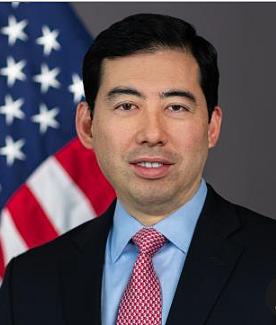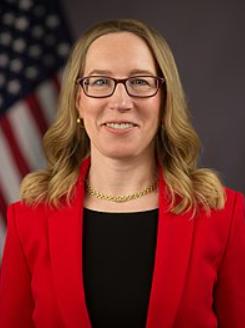
WASHINGTON, DC, February 10, 2025 (ENS) – The U.S. Securities and Exchange Commission, SEC, has created a Crypto Task Force with a page on its website detailing the agency’s new crypto regulatory agenda under its current leadership in President Donald Trump’s second administration.
Former SEC Chair Gary Gensler who served in President Joe Biden’s government has been temporarily replaced by SEC Commissioner Mark Uyeda, a Republican, who will serve as the agency’s acting chair until President Trump installs a permanent chair.

An American attorney and government official, Uyeda has served as a Commissioner of the SEC since June 30, 2022. He is the first Asian Pacific American to serve as an SEC Commissioner. Earlier, Uyeda served on the staff of the SEC for more than 15 years.
As SEC chairman, President Trump has nominated Paul Atkins, an American businessman who served on the U.S. Securities and Exchange Commission from 2002 to 2008. Since then, Atkins has worked as the CEO of his consulting firm, Patomak Global Partners. Its clients include banks, crypto companies and securities markets participants, and Atkins is known as a crypt-backer.
While Republicans are supportive of the nomination, Senate Democrats have issues with Atkins’ private ventures into cryptocurrency.
On December 04, 2024, the day on which President-elect Trump named Atkins to serve as the SEC Chair, U.S. Senator Elizabeth Warren of Massachusetts, who is the now the top Democrat on the Senate Banking Committee, issued a wary statement showing her strong interest in protecting consumers.
“The U.S. stock market is the envy of the world precisely because the SEC promotes safe and transparent markets that protect investors from getting cheated, so I’m concerned about putting at the helm of the SEC a Wall Street lobbyist whose main contribution during the last financial crisis was to protest fines against the giant corporations that defrauded investors,” Senator Warren said.
“I look forward to meeting with Paul Atkins to ask about his potential conflicts of interest and his commitment to serving the American people,” the senator said.
Atkins’ Senate hearing has yet to be scheduled. Meanwhile, SEC Commissioner Uyeda will lead the agency and SEC Commissioner Hester Peirce will lead the new Crypto Task Force.
“I look forward to the efforts of Commissioner Peirce to lead regulatory policy on crypto, which involves multiple SEC divisions and offices,” Acting Chairman Uyeda said.

“This undertaking will take time, patience, and much hard work. It will succeed only if the Task Force has input from a wide range of investors, industry participants, academics, and other interested parties. We look forward to working hand-in-hand with the public to foster a regulatory environment that protects investors, facilitates capital formation, fosters market integrity, and supports innovation,” Commissioner Peirce said.
The Task Force anticipates holding roundtables in the future, but in the meantime welcomes public input at Crypto@sec.gov.
The legal commenters at JD Supra say the crypto task force points to a move away from the SEC’s previous “enforcement-driven stance on cryptocurrency.”
Commissioner Peirce said in a statement that she “aims to address long-standing regulatory confusion that has plagued the crypto industry in recent memory. Under prior leadership, the SEC frequently pursued enforcement actions without providing clear guidelines, leaving crypto projects uncertain about compliance.”
Peirce has been a critic of this approach, arguing that the SEC’s inconsistent treatment of crypto assets has stifled innovation and forced companies to operate in a legal gray area, or leave the United States altogether.
Defining Cryptocurrency
Cryptocurrencies, such as the popular Bitcoin, are networks built on the blockchain, a financial ledger formatted in a sequence of individual blocks, each containing transaction data, according to the Massachusetts Institute of Technology.
These networks are decentralized, meaning there are no banks or organizations to manage funds and balances, so users join forces to store and verify the transactions.
But, MIT warns, decentralization leads to a scalability problem. To join a cryptocurrency, new users must download and store all transaction data from hundreds of thousands of individual blocks. They must also store these data to use the service and help verify transactions. This makes the process slow or computationally impractical for some.
“First,” Peirce explained in a February 4 statement entitled, “The Journey Begins,” that “despite now being charged with leading the SEC’s new Crypto Task Force, the views that I express are my own as a Commissioner and not necessarily those of the SEC or my fellow Commissioners. Commission positions always require a vote of the Commission.”
“It took us a long time to get into this mess, and it is going to take us some time to get out of it,” Peirce warned. “The Commission has engaged with the crypto industry in one form or another for more than a decade. The first bitcoin exchange-traded product application hit our doorstep in 2013, and the Commission brought a fraud case that had a tangential crypto element that same year.”
After mentioning many enforcement actions, exemptive relief, and “endless talk about crypto in speeches and statements, lots of meetings with crypto entrepreneurs many inter-agency and international crypto working groups,” Peirce said the outcome was “legal imprecision and commercial impracticality.”
Basically, Peirce said the task force will create a regulatory framework that protects investors , “the Task Force wants to travel to a destination where people have great freedom to experiment and build interesting things, and which will not be a haven for fraudsters. … We do not tolerate liars, cheaters, and scammers. As the Task Force works to help develop this regulatory framework, it will give careful consideration to antifraud protections.”
“If the Commission spots fraud that lies outside our jurisdiction, it can refer the matter to a sister regulator. If it does not fall within any regulator’s jurisdiction, the Commission can bring that gap to Congress’s attention,” Peirce explained.
Fourth, the Task Force is working to help create a regulatory framework that both achieves the Commission’s important regulatory objectives – including protecting investors—and preserves industry’s ability to offer products and services. … The statutes already on the books do not allow a free-for-all for products that fall within our jurisdiction. Congress has put parameters in place, and the Commission will apply them.”
And finally, Commissioner Peirce sets out what can be expected of the SEC’s new Crypto Task Force, and what cannot. It amounts to the directive: Don’t rely on “Mama Government.”
“The new commitment to a better regulatory environment should not be viewed as an endorsement of any crypto coin or token,” Peirce said. “Regardless of whether those tokens or coins fall within our jurisdiction, the Commission never endorses any product or service; there is no such thing as an SEC seal of approval.”
“Spinning up coins and tokens is easy,” she said. “If people want to buy a token or product that lacks a clear long-term value proposition, they should feel free to but should not be surprised if someday the price drops.”
“In this country, people generally have a right to make decisions for themselves, but the counterpart to that wonderful American liberty is the equally wonderful American expectation that people must decide for themselves, not look to Mama Government to tell them what to do or not to do, nor to bail them out when they do something that turns out badly,” Peirce said.
Peirce was tagged with the nickname “Crypto Mom” by online cryptocurrency enthusiasts after dissenting from the SEC’s 2018 decision to reject the bitcoin exchange traded fund championed by Tyler and Cameron Winklevoss.
On February 4, Peirce pledged that the task force will collaborate with others across the federal government, with state securities regulators, and with international counterparts.
“We invite builders, enthusiasts, and skeptics to engage with us to figure out what the final rules should be and what interim steps might help to foster innovation in the meantime,” she said.
Security Status: The status of crypto assets under the securities laws is fundamental to resolving many other questions. The Task Force is working to examine different types of crypto assets.
Scoping Out: The Task Force will identify some areas that fall outside the Commission’s jurisdiction. As an initial step, the staff welcomes requests for no-action letters. No-action letters typically come in the form of a staff statement addressing specific circumstances spelled out in the letter under which the staff will not recommend enforcement action to the Commission. This statement is specific to the particular circumstances but gives the broader public a helpful window into the staff’s thinking.
Coin and Token Offerings: The Task Force also is thinking about the possibility of recommending Commission action to provide temporary prospective and retroactive relief for coin or token offerings for which the issuing entity or some other entity willing to take responsibility provides certain specified information, keeps that information updated, and agrees not to contest the Commission’s jurisdiction in the event of a case alleging fraud in connection with the purchase and sale of the asset.
These tokens would be deemed to be non-securities and thus there would be no uncertainty as to whether they would be able to trade freely on secondary markets not registered with the SEC as long as the information is kept up-to-date and accurate.
This approach would bridge the gap until a more permanent rule or legislation could be finalized. It would provide a pathway for existing tokens to find their way out of the fog of uncertainty that obscures a feasible path forward and would encourage the provision of greater disclosure.
Registered Offerings: The Task Force will consider working with staff to recommend that the Commission modify existing paths to registration, including Regulation A and crowdfunding, so that people interested in registering token offerings will have a viable path for doing so.
Special Purpose Broker Dealer: The Task Force will explore possible updates to the special-purpose broker dealer no-action statement, which in its current form has not been a success. An initial change we may suggest is that the statement be expanded to cover broker-dealers that custody crypto asset securities alongside crypto assets that are not securities. We will work with the public to identify other obstacles to registration.
Custody Solutions for Investment Advisers: The Task Force will work with investment advisers to provide an appropriate regulatory framework within which advisers can safely, legally, and practically custody client assets themselves or with a third-party.
Crypto-Lending and Staking: We need to provide clarity about whether crypto-lending and staking programs are covered by the securities laws and, if so, how. We plan to work to help address how such programs can be structured consistent with the law.
Crypto Exchange-Traded Products: The Commission already is receiving SRO proposed rule changes to list new types of crypto exchange-traded products. The Task Force will work with the staff to provide clear statements about the approach used when approving or disapproving these applications. The Task Force will also assist the staff and the Commission in considering requests to modify certain features of existing exchange-traded products, including to allow for staking and in-kind creations and redemptions. Before these changes can be operationalized, however, the Commission may have to make progress on custody and other issues.
Clearing Agencies and Transfer Agents: The Task Force also plans to work on the intersection of crypto and clearing agency and transfer agent rules. We will continue to work with market participants interested in tokenizing securities or otherwise using blockchain technology to modernize traditional financial markets.
Cross-Border Sandbox: Many crypto projects are international in scope. The Task Force is considering ways to facilitate cross-border experimentation on a limited scale and temporary timeframe, with the possibility of more permanent, long-term approaches.
“This brief overview of how the Task Force is looking at the journey ahead is not exhaustive or definitive, but I hope it has piqued your interest,” Peirce said. “Although the obstacles to getting to our final destination of a sensible, clear ruleset are daunting, if we collaborate, the journey will be exhilarating and rewarding. This is the beginning of the conversation – one we do not want to have just with ourselves.”
The SEC’s Crypto Task Force webpage details what the Task Force is doing and invites engagement with the Task Force.
Written Submissions
If you would like to provide written input on the issues the Task Force is considering, including those described above, you may submit that input by sending an email with the subject line “Crypto Task Force Input” to crypto@sec.gov. Documents submitted will generally be posted on www.sec.gov.
The SEC instructs, “Submissions received will be posted without change or redaction of personal identifying information. You should only make submissions that you wish to make available publicly. You may request confidential treatment following this detailed procedure. We may redact in part or withhold entirely from publication submitted material that is obscene or subject to copyright. Please read our Privacy Act Notice to learn about how we may use the information you send to us.”
Meetings (In-Person or Virtual)
The Task Force will consider requests for in-person or virtual meetings with members of the public who would like to discuss approaches to addressing issues related to regulation of crypto assets, including those described above. To request a meeting, please complete the Request Form for Meetings with the Crypto Task Force. The Task Force requests that any person or firm requesting a meeting provide a brief written summary of the issues that it plans to discuss with Task Force members. The Task Force plans to post these summaries to the Commission’s website, which will increase the transparency of its engagement with the public and promote open dialogue among parties interested in these issues.
U. Austin First With Bitcoin
On June 3, 2024, the bitcoin wealth management firm Unchained and the University of Austin, UATX, announced a collaboration to create the first long-term endowment holding in bitcoin. The organizations are committed to raising $5 million in bitcoin for the University’s long-term endowment, the proceeds from which the University has committed will remain in bitcoin for a minimum of five years.
Unchained’s CEO and co-founder, Joseph Kelly, donated two bitcoin to inaugurate the campaign.
“I’ve been very passionate about what UATX is building in Austin. I’ve seen the values the organization places on free speech and on building a modern academic institution that’s integrated with the marketplace, and I’m thrilled to play a role in helping the university make bitcoin a part of its long term strategy,” Kelly said.
His initial donation, alongside Unchained’s ongoing commitment to secure and manage the account, sets the stage for further collaboration between UATX and the bitcoin community.
Thomas Hogan, associate professor with the University of Austin’s Center for Economics, Politics, and History, said, “University endowments are about serving students, and bitcoin provides a unique opportunity for advancing UATX’s commitment to cultivating future generations of leaders and innovators.”
Featured image: Dash cryptocurrency is digital cash. September 19, 2021 (Photo courtesy Dash Crypto via Unsplash)
© 2025, Environment News Service. All rights reserved. Content may be quoted only with proper attribution and a direct link to the original article. Full reproduction is prohibited.



